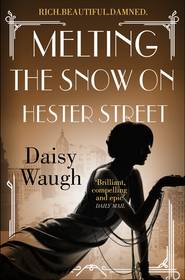По всем вопросам обращайтесь на: info@litportal.ru
(©) 2003-2024.
✖
Honeyville
Автор
Год написания книги
2018
Настройки чтения
Размер шрифта
Высота строк
Поля
‘Fight Freedom!’ muttered Max, lost in his memories. He pushed his plate away and hunched over his long legs, deep in thought. ‘The last time I saw her, we had a most idiotic squabble,’ he said at last. ‘Like a couple of spoiled kids.’
I knew it already, from the letter. But I could hardly admit to that. ‘I’m not surprised,’ I said.
‘Hm?’
‘Well. I read the article you wrote.’
He hesitated. ‘You mean – the tea party piece?’
‘The one she helped you with.’
‘Oh. Gosh, no.’ Max laughed. ‘That wasn’t what we fought about.’
‘Oh, I think it was! She was mortified.’
‘Nonsense!’ He laughed again. ‘I was reporting a story, Dora! It was why I ever came to Trinidad in the first place. She understood that perfectly. Besides …’ He stopped, seemed once again to think better of whatever he was about to say. ‘I’d offered her a job on the magazine! She’d already sent on half her luggage!’
‘I know. I helped her to pack it. She was so excited.’
‘So don’t tell me,’ he laughed, ‘don’t tell me that kid didn’t know what she was about.’
‘I don’t think she had the faintest idea. I don’t think there was ever a “kid” more out of her depth.’
But he didn’t seem to hear. ‘We used it as a perching-place in our editorial meetings for years, you know. “Inez’s Packing Case”. We used to read submissions aloud and if something was truly, spectacularly bad, one of us would sort of launch something at the packing case, and shout out—’
‘Fight Freedom?’
‘Fight Freedom.’ He sighed again. ‘Well. It was funny back then, I guess. I still have that case somewhere. That’s right. The darned packing case arrived OK. But Inez? Never turned up. I wrote her. A bunch of letters.’
‘You wrote to her?’
‘After we printed the tea party piece.’ He had the grace, at last, to look at least a little shamefaced. ‘When she didn’t materialize in New York.’
‘Where did you send the letters?’
He shrugged. ‘I don’t remember. A post-office box? It’s been a long time, Dora.’
‘I never saw any letters. I wonder what became of them?’
‘Well – but never mind the letters, Dora.’ He leaned towards me. ‘For God’s sakes, never mind the letters. What became of her? That’s what I’ve been trying to ask you. What became of Inez? She simply disappeared.’
Max told me last night that he was here in Hollywood on one of his famous speaking tours. It’s why he has come to California. He is on an anti-communist speaking tour. I think. Or maybe an in-favour-of-poetry tour. He is still a poet, after all. Last I heard him speak, twenty years ago, he was stirring up revolution in the bloody coalfields outside Trinidad, Colorado. He was a fine speaker, too. Passionate. Persuasive.
In any case, they must be paying him well. They have put him up at the Ambassador for the entire week. And I am invited to lunch with him again on Friday, which is just five days away. I have told him about her letter. I have told him I will deliver it to him at last.
We have plenty to catch up on, I think.
2 (#uf0dd83b0-f101-590f-aa7e-a8a3236d793b)
August 1913 Trinidad, Colorado
Inez and I were in the drugstore on North Commercial the first time we met. Under normal circumstances, Trinidad being Trinidad and we ladies both knowing our place, we would never have exchanged a word. I would have gazed at her from beneath the rim of my extravagant hat and wondered how she could put up with the limits of her respectable life: and she would have looked at me, from beneath the rim of her more restrained affair and felt – what?
Pity, probably.
And irritation about the hat. I dressed flamboyantly, in silks and lace and satin. It’s what made me all but invisible to the good ladies on Main Street, and in the drugstore on North Commercial.
There were no other customers in the store that day. It was just the two of us. Behind the counter, Mr Carravalho was coaxing Inez into parting with a few extra dollars for a skin-freshening potion which, had I been inclined, I might have told her didn’t work, since I had already tried it myself. I might have told her that she didn’t need any such potion in any case. Her skin was quite fresh enough. Everything about her seemed, in my weary state, to sing with a freshness and vim long since lost to me.
I knew who she was. Inez Dubois cut quite a dashing figure in our small town. She worked at the library, though it was generally believed that she had money of her own, and no need to work. She was unmarried, so far as I knew, about 26 or 27 years old. She lived with her aunt and uncle, Mr and Mrs McCulloch, who owned one of the finest houses in Trinidad, and she ran around town in her own little Ford Model T motorcar.
She looked, I used to think, rather like a beautiful doll: with small, pointed nose, and thick golden hair and round grey eyes, and a tiny, slim body that seemed to fizz with energy and life. I had seen her driving up Main Street towards the public library, her scarf flowing behind her, just like Isadora Duncan. And I had seen her at the issue desk in the library. In fact, on several occasions, being an enthusiastic reader, I had presented her with novels to stamp (respectable novels, I should add, nothing like the filthy French novels dear old William used to send me. They didn’t stock those at the Carnegie Library of Trinidad). There were occasions when I sensed she might have liked to talk, if only to share her literary opinions of the novels I was borrowing. But she always stamped and returned them without quite looking my way.
So there we were in Carravalho’s Drugstore. I was waiting in line to stock up on the usual medications, essential for my trade. Mr Carravalho knew me well and would have a package already prepared for me, and I was in no hurry. Which was fortunate, since Inez Dubois was taking her time. She was fussing and flirting with Mr Carravalho, informing him of her dire need to buy ‘something’to refresh her look, what with the heat of this long summer.
It was a warm August evening – a beautiful evening, after a burning hot day, and it being a Friday, there was much noise and festivity on the street. Beneath the rattle of the tram and the Salvation Army choir, singing its lungs out on the corner of Elm Street, there came laughter and chatter in a score of different languages. It was the busy, noisy, carefree sound you only heard in Trinidad when the hot, dust-filled prairie wind had eased at last, and the sun had cooled, and the long working week was almost over. Miners from the neighbouring camps were piling in off the trolley cars, the brick-factory workers were making their way from the north end of town, and the distillery workers too, and the shop clerks, the farm hands and the cattlemen, the hustlers, the rangers: they were all on the streets that evening. Trinidad was wearing its glad rags. I remember reflecting that it would likely be a busy night at Plum Street.
The door to Mr Carravalho’s shop stood open as I waited, and I was content to linger there, catching the evening breeze, listening in on the chatter. But my tranquillity was interrupted suddenly by angry shouts from the street. There, framed by the store’s door and only a few yards from where I stood, three men had appeared as if from nowhere and, in the space of a second – the second it took for me to locate them – a violent fight had broken out between them.
I recognized all three men. Two were private detectives, from the notorious Baldwin-Felts detective agency, hired by the coal company to report on revolutionary activity among the workers. They and their like had been throwing their weight around Trinidad these past few months. They roamed the streets with handguns tucked under their shirts, picking fights when and wherever the fancy took them. Nobody seemed to stop them – except Phoebe, my boss and the proprietress of Plum Street. Phoebe didn’t ban many men from our parlour house, so long as they could stand the bill. So it was a measure of how brutish they were that she had banned entrance to all the Baldwin-Felts men. They had a reputation for violence, here and across Colorado – all over America in fact. Wherever employers hired them to harass and intimidate their workers.
The third man wasn’t much better. Another out-of-towner, come to Trinidad to make mischief. It was Captain Lippiatt, employed by the other side. He was a Union man. And I knew him, because he had visited us at the parlour house.
The three men stood chest to chest, eyeball to eyeball, in the middle of North Commercial, the spit flying in each other’s faces: three great bulls of male-hood, of pure and dangerous absurdity, it seemed to me. I had no wish to be anywhere near them. I slipped deeper into the store.
Inez, on the other hand, seemed unaware of the danger. She looked up from her skin-freshening packaging, and exclaimed, ‘Oh my!’ at such a volume that one of the spitting men – it was Lippiatt – paused momentarily to glance in.
‘Mr Carravalho, what are they doing?’ she asked, ‘What on earth do you suppose they’re arguing about?’
‘Union men,’ he muttered, shrinking a little behind his high wooden counter. ‘Hush up now, Miss Dubois. We don’t want them coming in here.’
‘All three are Union men?’ she asked, staring brazenly and without dropping her voice. ‘Then why are they fighting? You might have thought, after all the trouble they cause, they would at least have the decency to agree with one another.’
‘There’s a bunch of them in town this week,’ he replied. ‘Causing trouble. Some kind of delegation at the theatre. Talking about a strike—’
‘But they’re not all Union men,’ I interrupted. I wasn’t supposed to speak to the likes of Miss Inez Dubois. And nor she to the likes of me, except in a soul-saving, charitable capacity. Mr Carravalho looked shocked and embarrassed. They both did. But I persevered. It wasn’t that I had any special loyalty to the Union men (far from it), but it struck me as just plain ignorant to pretend that the battle on our streets was being fought by only one army. ‘One of them is, but the other two on the right are Baldwin-Felts men. You know that, Mr Carravalho. They’re coal company heavies. And it’s no good taking sides. Those men are as bad as each other.’
The fight, meanwhile, seemed to have disbanded. Lippiatt was gone. Even so, the two Baldwin-Felts detectives lingered. They crossed over to the far side of the street, looking cautiously about them, dust whipping round their boots. The Friday night crowd gave them plenty of space.
‘What are they doing?’ Inez asked.
It was hard to tell. They were leaning side by side of each other against a power post directly opposite us, hands resting on guns that poked ostentatiously from under their shirts. They gazed up the street towards the Union offices a few doors down, but nothing happened.
‘Well!’ Inez sighed. ‘Thank goodness for that! Is it over? I should be heading back.’
‘I’m sure you’re right, Miss Dubois,’ Mr Carravalho said. ‘It’s rather late for a lady to be trekking the streets. And on an evening like this. With the Union coming into town.’ He shot me a glance. ‘You hurry on home. Will you be taking that?’ he indicated the package still in her hand.
She looked down, remembering it. ‘Why yes!’ she cried, as if it was quite the boldest and happiest decision she had ever settled upon. ‘Sure, I’ll take it! Why not?’ And while Mr Carravalho wrapped it, she looked again, past me – through me, I suppose – to the street outside, where the two detectives had still not moved on.











